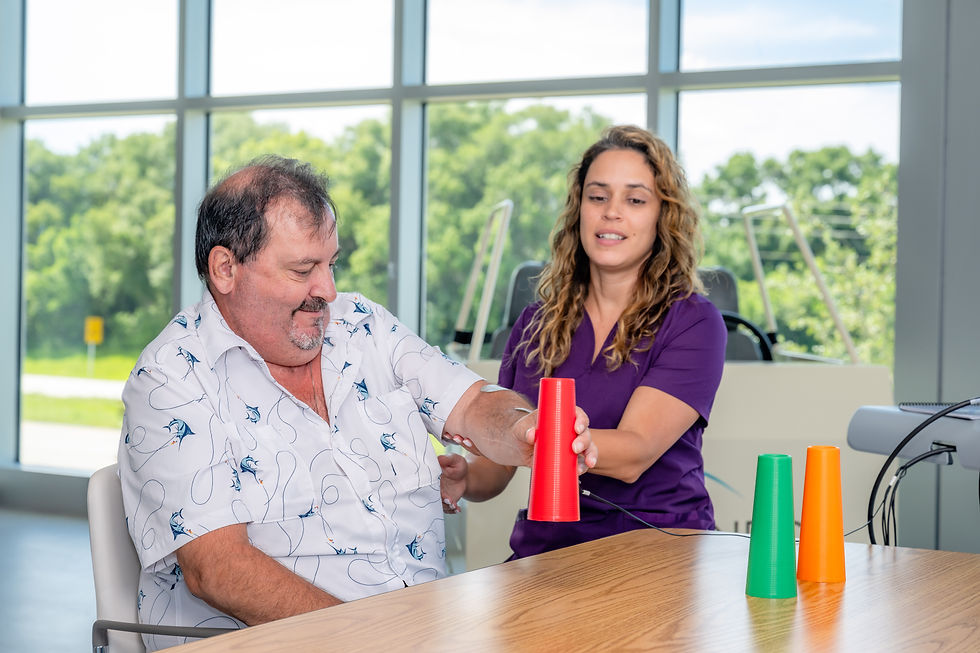Heart Month - Cardiovascular Disease Awareness and Rehabilitation
- Shreveport Rehabilitation Hospital

- Feb 13, 2023
- 3 min read
Cardiovascular disease is a threat to all, but the greatest health threat to women. Earlier this month we recognized The American Heart Association’s signature women’s initiative, Go Red for Women - designed to increase awareness of women’s heart health and improve the health of women globally. Being that February is American Heart Month, we continue to focus on the importance of caring for cardiovascular health in all - especially as it is the leading cause of death in Louisiana. The life-threatening results from heart disease, such as stroke and heart attacks, can often be prevented.
Understanding what heart disease is
Heart disease can be several different types of heart conditions with the most common type as coronary artery disease (CAD). The most common type of heart disease in the United States is coronary artery disease (CAD), which affects the blood flow to the heart and can lead to a heart attack.

What are the symptoms of heart disease?
People may not initially know they have heart disease until they have a heart attack, heart failure, or an arrhythmia (irregular heartbeat).
● Heart attack: Chest pain or heaviness, upper neck or back pain, heartburn, nausea or vomiting, extreme fatigue, dizziness, and shortness of breath.
● Arrhythmia-irregular heartbeat: Fluttering feelings in the chest (commonly called palpitations).
● Heart failure: Shortness of breath, swelling of the feet, ankles, legs, abdomen, or neck veins, and fatigue with minimal activity.
What are the risk factors for heart disease?
Heart disease can be preventable by avoiding these risk factors. Among the key risk factors are high blood pressure, high blood cholesterol, and smoking. About 47% of people have at least 1 of these risk factors. Some other conditions such as diabetes and lifestyle choices, such as being overweight, obesity, low physical activity, and excessive alcohol use can put people at a higher risk for heart disease.
What is cardiac rehabilitation?
Cardiac rehabilitation (rehab) is an important program for anyone recovering from a heart attack, heart failure, or various types of heart surgery. Cardiac rehab is a supervised program that can be managed as an outpatient or even inpatient when needed to regain strength and function, includes the following:
Education about healthy living with diet counseling and techniques to manage medications.
Cognitive resources and counseling are employed to facilitate communication about concerns and anxiety after a cardiac event or disease.
At Shreveport Rehabilitation Hospital, we have a multi-disciplinary team that will help you through cardiac rehab and collaborates with your healthcare team. Cardiac rehabilitation should incorporate physical therapy with an exercise program, occupational therapy to assist with activities of daily living, dietician expertise to facilitate healthy eating habits, and counselors or mental health professionals to work through the stress and emotions often caused by cardiac disease. Contact us at Shreveport Rehabilitation Hospital to learn more about your options for inpatient cardiac, stroke, or medical rehabilitation.
For more on our rehabilitation services please visit https://www.shreveport-rehabhospital.com/rehabilitation-services Shreveport Rehabilitation Hospital - 318.232.8880 | www.shreveport-rehabhospital.com
For more on American Heart Month and helpful tips visit https://www.cdc.gov/heartdisease/american_heart_month_patients.htm
*data derived from https://www.cdc.gov/nchs/pressroom/states/louisiana/la.htm











